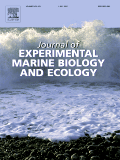
JOURNAL OF EXPERIMENTAL MARINE BIOLOGY AND ECOLOGY
Scope & Guideline
Fostering Insights into Aquatic Science and Ecology
Introduction
Aims and Scopes
- Marine Physiology and Biochemistry:
Research in this area includes studies on the physiological responses of marine organisms to environmental changes, such as temperature, salinity, and ocean acidification. The journal publishes findings that explore biochemical processes and how they affect growth, reproduction, and survival. - Ecological Interactions and Community Dynamics:
This scope covers studies on predator-prey relationships, competition, and the effects of biotic and abiotic factors on community structure and dynamics within marine ecosystems. The journal emphasizes experimental approaches to understanding these interactions. - Impact of Climate Change on Marine Ecosystems:
The journal highlights research examining the effects of climate change, including warming and acidification, on marine species and habitats. It publishes studies that assess resilience and adaptation mechanisms in marine organisms. - Conservation and Restoration Ecology:
Papers in this area focus on strategies for conserving marine biodiversity and restoring degraded ecosystems. The journal supports research that evaluates the efficacy of restoration techniques and the ecological implications of conservation efforts. - Innovative Research Methodologies:
The journal encourages the use of novel experimental designs and technologies in marine biology research, including field experiments, laboratory studies, and the application of advanced monitoring techniques.
Trending and Emerging
- Effects of Ocean Acidification and Warming:
There is a growing focus on how ocean acidification and rising temperatures impact marine species and ecosystems. Research is increasingly directed towards understanding physiological responses, community dynamics, and potential adaptations to these stressors. - Microplastics and Pollution Impact Studies:
Emerging research on the effects of microplastics and other pollutants on marine organisms is becoming more prevalent. This theme highlights the urgent need to understand the ecological consequences of pollution in marine environments. - Biodiversity and Ecosystem Functioning:
Studies investigating the relationship between biodiversity and ecosystem functioning are trending. Researchers are exploring how biodiversity contributes to the resilience and stability of marine ecosystems in the face of environmental changes. - Technological Innovations in Marine Research:
The use of advanced technologies, including remote sensing, UAVs, and molecular techniques, is on the rise. These innovations are enhancing data collection and analysis, allowing for more detailed and comprehensive studies of marine life and habitats. - Conservation Strategies and Restoration Ecology:
There is an increasing emphasis on research that evaluates conservation strategies and restoration efforts. This trend reflects a growing recognition of the importance of applied marine ecology in addressing biodiversity loss and habitat degradation.
Declining or Waning
- Traditional Fisheries Biology:
Research focusing solely on fisheries management and traditional stock assessments appears to be declining. This shift likely reflects a broader trend towards integrative approaches that consider ecosystem dynamics and the impacts of climate change on fish populations. - Descriptive Ecology:
Papers that provide primarily descriptive accounts of marine species or habitats without experimental or hypothesis-driven components are becoming less common. The journal increasingly favors studies that incorporate experimental designs to investigate ecological questions. - Single-Species Studies:
There is a noticeable decrease in studies focusing exclusively on individual species without considering their ecological interactions or environmental contexts. The trend is moving towards more holistic assessments that examine species within their broader ecological networks.
Similar Journals

Aquatic Biology
Unlocking Secrets of Marine and Freshwater LifeAquatic Biology, published by INTER-RESEARCH, is a leading open-access journal dedicated to the scientific exploration of aquatic ecosystems, promoting innovative research in the fields of aquatic science, ecology, and oceanography since its inception in 2007. With an E-ISSN of 1864-7782, the journal publishes original articles, reviews, and data papers that contribute to the understanding of aquatic biology in its myriad forms. As of 2023, it holds a respectable Q3 ranking across multiple categories including Aquatic Science and Ecology, reflecting its sustained impact within the scientific community. Situated in Germany, Aquatic Biology operates a policy of open access since 2014, ensuring that valuable research findings are readily available to researchers, professionals, and students worldwide, thus fostering collaboration and knowledge dissemination. By addressing diverse aquatic topics, the journal plays a crucial role in advancing the study and conservation of marine and freshwater environments, making it an essential resource for anyone seeking to deepen their understanding of aquatic systems.

CORAL REEFS
Exploring the Depths of Aquatic InnovationCORAL REEFS is a prestigious academic journal dedicated to advancing the understanding of coral reef ecosystems and promoting research in aquatic science. Published by SPRINGER, this journal has established itself as a leading platform in the field, with an impressive impact, ranked in the top quartile (Q1) for Aquatic Science in 2023. With its comprehensive focus, CORAL REEFS covers a wide array of topics, including ecology, conservation, and management of coral reefs, making it an essential resource for researchers, professionals, and students alike. The journal has been in continuous publication since 1982 and aims to foster collaboration and innovation among the global scientific community. Although not open access, access options are available through institutional subscriptions, enhancing the dissemination of groundbreaking research. The journal stands out for its contribution to understanding the complex dynamics of aquatic systems, solidifying its role in guiding future research and policy in marine conservation.
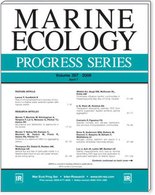
MARINE ECOLOGY PROGRESS SERIES
Innovating research for sustainable oceans.MARINE ECOLOGY PROGRESS SERIES, published by INTER-RESEARCH in Germany, is a premier journal dedicated to advancing the field of marine ecology. Renowned for its rigorous peer-review process and high-quality publications, it holds a Q1 ranking in various categories including Aquatic Science and Ecology according to the 2023 category quartiles. With an impressive Scopus ranking, the journal is positioned in the 80th percentile within the Ecology, Evolution, Behavior and Systematics field, attesting to its significant impact in marine research. Covering a broad scope from basic ecological research to applied marine science, MARINE ECOLOGY PROGRESS SERIES aims to facilitate scientific exchange and promote the understanding of marine ecosystems. Researchers and professionals looking to stay abreast of the latest developments and findings in marine ecology will find this journal indispensable for enhancing their knowledge and contributing to ongoing discussions in the field.
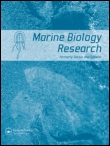
Marine Biology Research
Innovating research for thriving ocean ecosystems.Marine Biology Research is a premier journal published by Taylor & Francis, focusing on the dynamic field of marine biology and its intersecting realms of aquatic science, ecology, and oceanography. Since its inception in 2005, this journal has served as a crucial platform for researchers and professionals to disseminate their findings, with a vision extending to 2024 and beyond. The journal is recognized with a Q3 quartile ranking in both Aquatic Science and Ecology, Evolution, Behavior and Systematics, underscoring its growing influence in these fields as evidenced by its Scopus rankings. Located in the United Kingdom, Marine Biology Research aims to foster collaboration and innovation through open access options, facilitating knowledge exchange among the academic community. With a steady commitment to advancing marine sciences, this journal is an invaluable resource for those dedicated to understanding and preserving our ocean ecosystems.

REVISTA DE BIOLOGIA MARINA Y OCEANOGRAFIA
Advancing Understanding of Oceanic EcosystemsREVISTA DE BIOLOGIA MARINA Y OCEANOGRAFIA is a prominent academic journal dedicated to the fields of marine biology and oceanography, published by the Faculty of Marine Sciences and Natural Resources at Universidad de Valparaíso, Chile. Since its inception in 1996, this journal has been a vital platform for disseminating research findings and advancements in aquatic sciences, covering a breadth of topics relevant to the marine environment. With its current impact positioned within the Q4 quartile of both Aquatic Science and Oceanography categories in 2023, the journal serves as an essential resource for scholars, practitioners, and students alike, aiming to enhance their understanding of marine ecosystems. While the journal does not provide open access options, it continues to contribute valuable insights, helping to foster a deeper appreciation for oceanographic science and marine biodiversity. Located in the scenic city of Viña del Mar, Chile, this publication invites manuscripts that push the boundaries of knowledge and stimulate discourse within the marine sciences community, thereby promoting sustainable management and conservation of oceanic resources.

MARINE AND FRESHWATER BEHAVIOUR AND PHYSIOLOGY
Fostering Innovation in Aquatic Science and OceanographyMARINE AND FRESHWATER BEHAVIOUR AND PHYSIOLOGY, published by Taylor & Francis Ltd, is a renowned academic journal dedicated to advancing the understanding of the behavioral and physiological aspects of aquatic organisms. Established in 1994, the journal serves as a pivotal platform for researchers and professionals in the fields of Aquatic Science and Oceanography, offering valuable insights into the interactions between aquatic species and their environments. With an impact factor reflecting its significance in the academic community, it occupies a notable position in Category Quartiles, currently ranking Q3 in both Aquatic Science and Oceanography. Researchers are encouraged to explore a wide range of topics reflecting the complexity and diversity of marine and freshwater ecosystems. Although the journal is not open access, its contributions continue to influence both current research and future investigations, making it an essential resource for anyone engaged in the study of aquatic life.
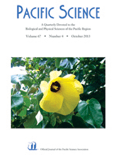
PACIFIC SCIENCE
Empowering Voices Through Pacific ScholarshipPACIFIC SCIENCE is a prestigious multidisciplinary journal published by University of Hawaii Press, dedicated to advancing knowledge across diverse fields of study related to the Pacific region. With a robust ISSN of 0030-8870 and an E-ISSN of 1534-6188, this journal serves as a vital platform for researchers, professionals, and students to disseminate and access influential research findings that contribute to the understanding of ecological, cultural, and social dynamics in the Pacific. The journal has steadily maintained its relevance since its inception in 1947 and features a commendable Scopus Rank of #74 out of 171 in the multidisciplinarity category, placing it in the 57th percentile of its field, and is recognized as having a Q2 quartile ranking in 2023. Although lacking open access options, PACIFIC SCIENCE offers in-depth analysis and scholarly discourse, effectively bridging various disciplines to foster collaboration and innovation. With its commitment to high-quality research and its significant impact on Pacific studies, the journal continues to play an important role in informing policy, conservation efforts, and community engagement within this vital region.
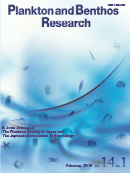
Plankton & Benthos Research
Cultivating a Platform for Ecological ExcellencePlankton & Benthos Research, published by the Plankton Society of Japan, serves as a pivotal platform in the fields of Aquatic Science, Ecology, and Oceanography. With its inception in 2006 and ongoing publication until 2024, this esteemed journal focuses on the complex interactions within aquatic ecosystems, emphasizing the significance of plankton and benthic organisms in maintaining ecological balance. Although it is categorized in the Q3 quartile across several disciplines, it continues to provide valuable insights and a forum for researchers to share innovative findings and methodologies. The journal is not currently open access, which ensures a layer of curator-driven content quality. Its impact, measured through Scopus rankings, showcases its role in fostering knowledge exchange among academics and professionals engaged in ecological and environmental studies. With an ISSN of 1880-8247 and E-ISSN 1882-627X, Plankton & Benthos Research invites contributions that enhance our understanding of the aquatic realm, establishing itself as a crucial resource for ongoing research and advancement in these essential fields.

MARINE BIOLOGY
Connecting Researchers to the Wonders of the SeaMARINE BIOLOGY, published by Springer Heidelberg, is a leading international journal that has served as a crucial platform for the dissemination of research in marine ecosystems since its inception in 1967. With a strong emphasis on the biological aspects of marine environments, this journal stands out in its field, holding a prestigious Q1 ranking in categories such as Aquatic Science and Ecology for 2023. Researchers and academicians will find valuable insights into ecological, evolutionary, and behavioral studies, making it an essential resource for those investigating marine organisms and their interactions. The journal is indexed in key databases and achieves a commendable rank in various Scopus categories, ensuring a broad visibility for published work. As the field of marine biology continues to grow in relevance, particularly in light of environmental changes and biodiversity loss, MARINE BIOLOGY provides an indispensable platform for advancing knowledge and fostering scientific discourse within the global research community.

VIE ET MILIEU-LIFE AND ENVIRONMENT
Empowering Scholars to Navigate Environmental DynamicsVIE ET MILIEU - LIFE AND ENVIRONMENT is a pivotal journal in the realms of aquatic science and ecology, serving as a vital platform for researchers and professionals interested in the interconnections between living organisms and their environments. Published by the esteemed OBSERVATOIRE OCEANOLOGIQUE BANYULS in France, this journal has been disseminating valuable research since its inception in 1980, with volumes covering various topics pertinent to environmental dynamics through to 2024. Despite its current classification in the Q4 quartile for both aquatic science and ecology, the journal offers a unique opportunity for scholars to contribute to niche areas often overlooked by more prominent publications. VIE ET MILIEU is committed to fostering a comprehensive understanding of ecological interactions and the conservation of aquatic ecosystems, making it an essential resource for those engaged in environmental science and biology. Researchers can access a wealth of knowledge that supports their work, encourages collaboration, and inspires innovative approaches to pressing ecological issues.